Mood Selection in Relative Clauses by French–Spanish Bilinguals: Contrasts and Similarities between L2 and Heritage Speakers
Abstract
1. Introduction
2. Mood Selection in Spanish Relative Clauses
2.1. Mood Selection in Spanish and French Relative Clauses
| 1. | a. | Busco | una mujer que | tenga dinero. | [−existential] |
| Look.for-PRS.1SG | a woman that | has-sbjv money. | |||
| ‘I’m looking for a woman with money.’ | |||||
| b. | Busco | a un hombre que | es rico. | [+existential] | |
| Look.for-PRS.1SG | a man that | is-IND rich. | |||
| ‘I’m looking for a man who is rich.’ | |||||
| 2. | * Tengo | un libro que | me interese. |
| have-PRS.1SG | a book that | me interests-SBJV | |
| ‘I have a book I might be interested in.’ | |||
| 3. | Puedo | tener | un libro que | me interese. |
| Can-PRS.1SG | have | a book that | me interests-SBJV | |
| ‘I may have a book I might be interested in.’ | ||||
| 4. | Contrataremos | una persona | que | sepa | idiomas. |
| hire-FUT.1PL | a person | that | knows-SBJV | languages | |
| ‘We will hire a person who can speak several languages.’ | |||||
| 5. | Busco | un inversor que | tenga dinero. |
| Look.for-PRS.1SG | an investor that | has-SBJV money | |
| ‘I am looking for an investor that has money.’ | |||
| 6. | a. | Je cherche | quelqu’un qui | soit parisien. |
| I look.for-PRS.1SG | someone that | is-SBJV parisian | ||
| ‘I am looking for someone that is Parisian.’ | ||||
| b. | Je cherche | quelqu’un qui | est parisien. | |
| I look.for-PRS.1SG | someone that | is-IND parisian | ||
| ‘I am looking for someone that is Parisian.’ | ||||
2.2. Studying Mood Selection in L2 and Heritage Language Speakers: A Word on Task Effects
3. Our Study
3.1. Research Questions
3.2. Participants
3.3. Experimental Design
3.3.1. Task 1: Sentence Combination Felicity Task—Written Version
| 7. | a. | Buscamos un restaurante que no cuesta/cueste muy caro. |
| ‘We are looking for a restaurant that is-IND/SBJV not too expensive.’ | ||
| b. | Me han dicho que se llama “El Marino”. | |
| ‘I was told its name was “El marino”.’ |
| 8. | a. | Debes leer un libro que te permita comprender el subjuntivo. |
| ‘You must read a book that allows-SBJV you to understand the subjunctive mood.’ | ||
| b. | En esta biblioteca seguro encontrarás alguno. | |
| ‘You will probably find one in this library.’ | ||
| 9. | a. | * Quiero una habitación que tiene mucha luz, |
| ‘I want a room that is-IND very bright.’ | ||
| b. | pero solo hay habitaciones oscuras en este edificio. | |
| ‘but there are only dark rooms in this building.’ | ||
| 10. | a. | * Veremos una película que esté nominada a un Oscar. |
| ‘We are going to see a movie that is-SBJV nominated for an Oscar.’ | ||
| b. | Se titula Boyhood. | |
| ‘It’s called Boyhood’. |
3.3.2. Task 2: Elicited Production Task
| 11. | a. | Tu dois lire un livre qui te _________ (permettre) de comprendre le subjonctif. |
| ‘You must read a book that ________ (allow) you to understand the subjunctive mood.’ | ||
| b. | Dans cette bibliothèque tu en trouveras sûrement un. | |
| ‘You will probably find one in this library.’ |
| 12. | a. | Nous allons voir un film qui _________ (être) nominé pour un Oscar. |
| ‘We are going to see a movie that ________ (is) nominated for an Oscar.’ | ||
| b. | Il s’intitule Boyhood. | |
| ‘It’s called Boyhood’. |
3.3.3. Task 3: Sentence Combination Felicity Task—Oral Version
4. Results and Discussion
4.1. Sentence Combination Felicity Tasks (in Spanish)
4.1.1. Task 1—Written Version
| 13. | Original item (Participant HLSIM07) | |
| Compraré un traje que va bien con el tuyo, si encuentro alguno en esta tienda. | ||
| ‘I will buy a suit that matches yours, if I find any at that store.’ | ||
| Correction | ||
| Compraría un traje que va bien con el tuyo, si encuentro alguno en esta tienda. | ||
| ‘I would buy a suit that matches yours, if I find any at that store’. | ||
| 14. | Original item (Participant L1SP02) | |
| En esta biblioteca puedes leer un libro que esté escrito en alemán. Hay muchos en el segundo piso. | ||
| ‘In this library, you can read a book that is written in German. There are many on the second floor.’ | ||
| Correction | ||
| En esta biblioteca puedes leer libros escritos en alemán. Hay muchos en el segundo piso. | ||
| ‘In this library, you can read books written in German. There are many on the second floor.’ | ||
4.1.2. Task 3—Oral Version
4.1.3. Task 1 (Written) vs. Task 3 (Oral)
4.1.4. Some Remarks on the HL Group
4.2. Sentence Completion Task (in French)—Task 2
4.3. Analysis and Discussion
5. Conclusions
Author Contributions
Funding
Acknowledgments
Conflicts of Interest
Appendix A
- Contrataremos una persona que hable holandés, si logramos encontrar alguna.
- Luis y Pedro quieren amueblar la casa porque les gusta más vacía.
- Quiero una lavadora que indica la temperatura. La venden en Amazon y está barata.
- Esteban y su hermano se parecen mucho. Siempre los confundo.
- Compraré una casa que queda en el centro, si hay alguna a buen precio.
- Necesitamos un director que le conviene a la empresa pero creo que ninguno de los candidatos es bueno para dirigir.
- Tengo que alquilar una camioneta para la mudanza. Nos mudamos este sábado.
- Quiero un motor que no haga ruido, pero no hay ninguno en esta tienda.
- Tengo que resolver un problema difícil, por eso necesito tu ayuda.
- Quiero un libro que contenga muchos personajes fantásticos. Se titula “La historia sin fin”.
- Viajaremos a Canadá en el verano porque queremos conocer la nieve.
- Compraré un traje que va bien con el tuyo, si encuentro alguno en esta tienda.
- Tenemos que encontrar una enciclopedia que muestra todos los cuadros de Picasso. No recuerdo en qué estante la puse.
- Me gusta mucho la pera pero prefiero la manzana.
- Podemos navegar en un barco que tenga cuatro cabinas. Es aquel que pertenece a la compañía “Caribe sol”.
- Necesitamos un autobús que tiene asientos vacíos pero están todos llenos.
- Busco a mi perro porque no quiero encontrarlo.
- Debo comprar una corbata que va bien con mi camisa azul. ¿Cuál me recomiendas?
- María debe comprar un perro porque tiene ratones en la casa.
- Buscamos un perro que tenga una sola oreja. Se llama Fido.
- Con tu experiencia como curador artístico, puedes trabajar en una tienda que vende obras de arte. Busca en Internet, seguro hay alguna en esta ciudad.
- Prefiero un museo que tenga dinosaurios pero si tiene dinosaurios no me gusta.
- Debes utilizar un ordenador que esté conectado a la red. Es el que está al lado de la puerta de entrada.
- Contrataremos un músico que toca el bajo pero por el momento solo encontramos pianistas.
- Necesitamos un gato porque hay ratones en casa.
- Buscamos un restaurante que no cuesta muy caro, me han dicho que se llama “El Marino”.
- Mis abuelos visitarán un lugar en el que hace buen tiempo. Se van para Cuba.
- Iremos al cine a ver una película sobre los dinosaurios. Comienza a las 4:00.
- Leeré un libro que habla de Beethoven. Me lo regaló mi hermano.
- Tengo que organizar una cena para vegetarianos, por eso he comprado carne de res y de cerdo.
- Necesito un lápiz que escriba oscuro. Es ese rojo que está sobre la mesa, ¿me lo pasas?
- Veremos una película que esté nominada a un Oscar. Se titula Boyhood.
- Busco un hotel barato pero todos son caros.
- Tenemos que encontrar un mapa que muestre los lugares turísticos de Roma. Creo que lo puse en la maleta verde.
- Comeremos una manzana que está barata esta semana. La cultivan aquí en Quebec.
- Quiero una habitación que tiene mucha luz pero solo hay habitaciones oscuras en este edificio.
- Debo vender una casa que tiene piscina y jardín. Creo que será difícil venderla porque es muy cara.
- Quiero comprar unos zapatos para la carrera del domingo.
- En esta biblioteca puedes leer un libro que esté escrito en alemán. Hay muchos en el segundo piso.
- Busco un libro que tiene reproducciones de pinturas de Leonardo da Vinci. Es azul y verde, ¿no lo has visto?
- Necesito un libro para leer pero no sé leer.
- Te cantaré una canción que te haga feliz. ¿Tienes alguna sugerencia?
- Tengo que cocinar un plato que le guste mucho. Dime qué le gusta comer.
- Es suficiente con dos litros de leche pero cuatro litros no alcanzan.
- Necesito un libro que ayude a comprender la física de manera fácil, pero creo que nadie ha escrito todavía un libro así.
- Pediremos una comida que contenga poca grasa. ¿Me recomienda algún plato en particular?
- Esta noche podemos ver un programa que critica el sistema de salud. Comienza a las 10:00.
- Miguel prefiere jugar al fútbol que al tenis. Es que el fútbol es un deporte más divertido.
- Tengo que alquilar una camioneta que carga hasta 1000 kilogramos pero no existe ninguna así.
- Miguel busca un negocio que venda muebles antiguos. Le han dicho que en la capital podrá encontrar alguno.
- Laura verá en el cine una película que la haga llorar. La ha visto más de diez veces.
- Juan tiene que ir al trabajo en bicicleta porque está desempleado.
- Debes leer un libro que te permita comprender el subjuntivo. En esta biblioteca seguro encontrarás alguno.
- En el próximo concierto tocaremos una guitarra que tenga doce cuerdas. La acabo de comprar en la tienda.
Appendix B
- Laura verra au cinéma un film qui la _________ (faire) pleurer. Elle l’a vu plus de dix fois.
- Je veux un livre qui ___________ (contenir) de nombreux personnages fantastiques. Il s’intitule “The Neverending Story”.
- Nous devons trouver une encyclopédie qui __________ (contenir) tous les tableaux de Picasso. J’ai oublié dans quelle étagère je l’ai mise.
- Je vais chanter une chanson qui te __________ (rendre) heureux. J’espère être capable de la composer.
- Nous avons besoin d’ un directeur qui __________ (convenir) le mieux à l’entreprise, mais je pense qu’ aucun des candidats n’est bon pour diriger.
- Mes grands-parents iront visiter un endroit où il ___________ (faire) beau. Ils iront à Cuba.
- Avec ton expérience en tant que commissaire artistique, tu peux travailler dans un magasin qui ____________ (vendre) des œuvres d’art. Recherche sur Internet, je suis sûre qu’il y en a certains dans cette ville.
- J’ai besoin d’un crayon qui __________ (écrire) sur le verre. C’est celui qui est sur la table, peux-tu me le passer?
- Je dois vendre une maison qui _________ (avoir) une piscine et un jardin. Je pense qu’elle sera difficile à vendre, car elle est très chère.
- Nous allons commander un repas qui __________ (contenir) peu de graisse. Recommandez-vous un plat en particulier?
- Je cherche un livre qui __________ (contenir) des reproductions des tableaux de Léonard de Vinci. Il est bleu et vert, l’as-tu vu?
- Nous pouvons naviguer dans un bateau qui _____________ (avoir) quatre cabines. Il appartient à l’entreprise “Les Caraïbes.”
- Je veux une laveuse qui _______________ (dire) la température. On la vend sur Amazon à bon prix.
- Miguel cherche un magasin qui ____________ (vendre) des meubles anciens. On lui a dit qu’au centre-ville il pourra en trouver un.
- Je dois louer un camion qui __________ (pouvoir) charger jusqu’à 1000 kg, mais il n’y en a aucun.
- Nous allons embaucher un musicien qui ___________ (être) bassiste, mais jusqu’à présent, nous n’avons trouvé que des pianistes.
- Je veux un moteur qui ne __________ (faire) pas de bruit, mais il n’y en a aucun dans ce magasin.
- Je vais lire un livre qui __________ (contenir) la biographie de Beethoven. Mon frère me l’a donné en cadeau.
- Ce soir, nous pouvons regarder une émission qui _____________ (faire) une critique du système de santé. Elle commence à 10h00.
- J’achèterai un habit qui _________ (allez) bien avec le tien, si j’en trouve un dans ce magasin.
- Tu dois lire un livre qui te ____________ (permettre) de comprendre le subjonctif. Dans cette bibliothèque tu en trouveras sûrement un.
- Je dois acheter une cravate qui ___________ (aller) bien avec ma chemise bleue. Laquelle me recommanderiez-vous?
- Je veux une chambre qui ___________ (être) bien éclairée, mais il n’y a que des pièces sombres dans ce bâtiment.
- Ce soir au concert, nous allons rencontrer un chanteur qui ___________ (être) aussi un guitariste très doué. Il s’appelle Antonio.
- Nous cherchons un restaurant qui __________ (être) pas très cher. On m’a dit qu’ils’appelle “El Marino”.
- Nous devons trouver une carte qui __________ (contenir) les sites touristiques de Rome. Je pense que je l’ai mise dans la valise verte.
- Nous allons voir un film qui _________ (être) nominé pour un Oscar. Il s’intitule “Boyhood”.
- Nous avons besoin de monter à bord d’un autobus qui _________________ (avoir) des sièges libres, mais tous les autobus sont pleins.
- Je dois préparer un plat qui __________ (être) à son goût. Dites-moi ce qu’il préfère manger.
- Je vais acheter une maison qui __________ (être) au centre-ville, si j’en trouve une pas trop cher.
- Tu dois utiliser un ordinateur qui __________ (être) connecté au réseau. C’est celui qui est sur la table à l’entrée du laboratoire.
- Nous cherchons un chien qui n’______________ (avoir) qu’une seule oreille; il s’appelle Fido.
- Nous mangerons une sorte de pomme qui __________ (être) en rabais cette semaine. On la cultive ici au Québec.
- Dans cette bibliothèque tu peux lire un livre qui _________ (être) écrit en allemand. Il y en a beaucoup au deuxième étage.
- Nous allons embaucher quelqu’un qui _____________ (comprendre) le néerlandais, si nous pouvons trouver quelqu’un.
- J’ai besoin d’un livre qui _______________ (décrire) de manière facile la physique, mais je crois qu’aucun auteur ne serait capable d’expliquer la physique de manière facile.
References
- Alba de la Fuente, Anahi. 2012. Clitic Combinations in Spanish: Syntax, Processing and Acquisition. Ph.D. dissertation, University of Ottawa, Ottawa, ON, Canada. Available online: http://dx.doi.org/10.20381/ruor-5926 (accessed on 20 January 2016).
- Blake, Robert. 1983. Mood Selection Among Spanish-Speaking Children, Ages 4 to 12. The Bilingual Review/La Revista Bilingüe 10: 21–32. [Google Scholar]
- Borgonovo, Claudia, Joyce Bruhn De Garavito, and Philippe Prévost. 2008. Methodological Issues in the L2 Acquisition of a Syntax/Semantics Phenomenon: How to Assess L2 Knowledge of Mood in Spanish Relative Clauses. In Selected Proceedings of the 10th Hispanic Linguistics Symposium. Edited by Joyce Bruhn de Garavito and Elena Valenzuela. Somerville: Cascadilla Proceedings Project, pp. 13–24. [Google Scholar]
- Borgonovo, Claudia, Joyce Bruhn De Garavito, and Philippe Prévost. 2015. Mood selection in relative clauses: Interfaces and variability. Studies in Second Language Acquisition 37: 33–69. [Google Scholar] [CrossRef]
- Bosque, Ignacio. 1999. Sobre la gramática de los contextos modales: Entornos modales y expresiones inespecíficas en español. In Actas del XI Congreso Internacional de la Asociación de Lingüística y Filología de la América Latina Las Palmas de Gran Canaria, del 22 al 27 de julio de 1996. Las Palmas: Servicio de Publicaciones de la Universidad de Las Palmas, pp. 43–58. [Google Scholar]
- Boudreau, Geneviève. 2007. El Modo en la Esfera Nominal: Análisis y Adquisición. Master’s thesis, Université Laval, Québec, QC, Canada. Available online: http://hdl.handle.net/20.500.11794/19268 (accessed on 16 November 2016).
- Bowles, Melissa A. 2011. Measuring implicit and explicit linguistic knowledge: What Can Heritage Language Learners Contribute? Studies in Second Language Acquisition 33: 247–71. [Google Scholar] [CrossRef]
- Cook, Vivian. 2003. The changing L1 in the L2 user’s mind. In Effects of the Second Language on the First. Edited by Vivian Cook. Clevedon: Multilingual Matters, pp. 1–18. [Google Scholar]
- De Leeuw, Joshua R. 2015. jsPsych: A JavaScript library for creating behavioral experiments in a Web browser. Behavior Research Methods 47: 1–12. [Google Scholar] [CrossRef] [PubMed]
- Dussias, Paola E., and Nuria Sagarra. 2007. The effect of exposure on syntactic parsing in Spanish–English bilinguals. Bilingualism: Language and Cognition 10: 101–16. [Google Scholar] [CrossRef]
- Ellis, Rod. 2005. Measuring implicit and explicit knowledge of a second language: A Psychometric Study. Studies in Second Language Acquisition 27: 141–72. [Google Scholar] [CrossRef]
- Kecskes, Istvan. 2008. The effect of the second language on the first language. Babylonia 2: 31–34. [Google Scholar]
- Koenig, Renee Elizabeth. 2016. La selección modal del subjuntivo/indicativo en el Corpus sociolingüístico Preseea-Medellín. In Boletín de Filología. vol. 51, pp. 89–120. [Google Scholar] [CrossRef]
- Lareau, François. 2008. Vers une Grammaire D’unification Sens-Texte du Français: Le Temps Verbal Dans L’interface Sémantique-Syntaxe. Ph.D. dissertation, Université de Montréal/Université Paris 7, Montréal, QC, Canada, August. Available online: http://hdl.handle.net/1866/6421 (accessed on 5 September 2016).
- Lipski, John. 1993. Creoloid phenomena in the Spanish of transitional bilinguals. In Spanish in the United States. Edited by Ana Roca and John Lipski. Berlin: Mouton, pp. 155–73. [Google Scholar]
- Lynch, Andrew. 1999. The Subjunctive in Miami Cuban Spanish: Bilingualism, Contact, and Language Variability. Ph.D. dissertation, University of Minnesota, Minneapolis, MN, USA, August. Available online: http://works.bepress.com/andrewlynch/22/ (accessed on 10 January 2018).
- Menanteau, Didier. 1986. Le mode verbal, classe grammaticale? La Linguistique 22: 69–80. [Google Scholar]
- Merino, Barbara. 1983. Language loss in bilingual chicano children. Journal of Applied Developmental Psychology 4: 277–94. [Google Scholar] [CrossRef]
- Montrul, Silvina. 2007. Interpreting mood distinctions in Spanish as a heritage language. In Spanish in Contact: Policy, Social and Linguistic Inquiries. Edited by Kim Potowski and Richard Cameron. Amsterdam: John Benjamins, pp. 23–40. [Google Scholar]
- Montrul, Silvina. 2012. Is the heritage language like a second language? Eurosla Yearbook 12: 1–29. [Google Scholar] [CrossRef]
- Montrul, Silvina, and Silvia Perpiñán. 2011. Assessing differences and similarities between instructed heritage language learners and L2 learners in their knowledge of Spanish tense-aspect and mood (TAM) morphology. Heritage Language Journal 8: 90–133. [Google Scholar]
- Montrul, Silvina, Rebecca Foote, and Silvia Perpiñán. 2008. Gender agreement in adult second language learners and Spanish heritage speakers: The effects of age and context of acquisition. Language Learning 58: 503–53. [Google Scholar] [CrossRef]
- Murillo, Jorge. 2000. Oraciones de relativo y variación modal en el habla culta costarricense. Revista de Filología Española 80: 141–153. [Google Scholar] [CrossRef]
- Paradis, Michel. 2004. A Neurolinguistic Theory of Bilingualism. Amsterdam: John Benjamins. [Google Scholar]
- Pavlenko, Aneta, and Scott Jarvis. 2002. Bidirectional Transfer. Applied Linguistics 23: 190–214. [Google Scholar] [CrossRef]
- Pérez-Leroux, Ana Teresa. 1998. The acquisition of mood selection in Spanish relative clauses. Journal of Child Language 25: 585–604. [Google Scholar] [CrossRef] [PubMed]
- Restorick Elordi, Audrey K. 2012. Interpretation of the French and Spanish Subjunctive by L1, L2, and L3 Speakers: Contexts Where Mood Can Alternate without Ungrammaticality. Ph.D. dissertation, University of Western Ontario, London, ON, Canada. Available online: https://ir.lib.uwo.ca/etd/1055/ (accessed on 29 September 2016).
- Silva-Corvalán, Carmen. 1994. Language Contact and Change: Spanish in Los Angeles. New York: Oxford University Press. [Google Scholar]
- Silva-Corvalán, Carmen. 2003. Linguistic consequences of reduced input in bilingual first language acquisition. In Linguistic Theory and Language Development in Hispanic Languages. Edited by Silvina Montrul and Francisco Ordóñez. Sommerville: Cascadilla Press, pp. 375–97. [Google Scholar]
- Silva-Corvalán, Carmen. 2014. Bilingual Language Acquisition: Spanish and English in the First Six Years. Cambrigde: Cambridge University Press. [Google Scholar]
- Slabakova, Roumyana, and Silvina Montrul. 2002. On viewpoint aspect interpretation and its L2 acquisition. In The L2 acquisition of tense-aspect morphology. Edited by Rafael Salaberry and Yasuhiro Shirai. Amsterdam: John Benjamins, pp. 363–95. [Google Scholar]
- van Osch, Brechje, and Petra Sleeman. 2016. Spanish heritage speakers in the Netherlands: Linguistic patterns in the judgment and production of mood. International Journal of Bilingualism. [Google Scholar] [CrossRef]
- Zentella, Ana Celia. 1997. Growing up Bilingual. Malden: Blackwell. [Google Scholar]
| 1 | ||||||||||||||||
| 2 | Most participants from the experimental groups completed all three tasks. However, some participants only completed two out of the three tasks (either Tasks 1 and 2, or Tasks 2 and 3), hence the difference in the composition of groups from task to task. | |||||||||||||||
| 3 | The “other” category included the use of non-finite forms and conditional, which was the most frequent response in this category. An example of a response using conditional is presented in (i).
| |||||||||||||||
| 4 | One anonymous reviewer wondered whether the saliency of the subjunctive (i.e., irregular forms, such as tenga, from the verb tener, ‘to have’, as opposed to regular forms, such as venda, from the verb vender, ‘to sell’) may have played a role in the results of the native control group. Specifically, the reviewer wondered whether the indicative–subjunctive distinction could have been more easily misperceived in the oral task given that the difference between indicative and subjunctive forms is less salient in the case of regular verbs (e.g., vende vs. venda) than irregular verbs (e.g., tiene vs. tenga). Even though the saliency of the verb form was not a variable included in the experimental design, the distribution of regular and irregular verbs in our items was rather even, with 56% of items containing a regular verb and 44% containing an irregular verb. The results of a repeated measures ANOVA reveal that there was, indeed, a main effect for saliency (F(1, 30) = 7.587, p = 0.010). Specifically, our data reveal that participants tended to reject inappropriate mood choices more strongly when they contained an irregular verb, which is in line with the reviewer’s prediction. However, there was no significant interaction between saliency and task mode (oral/written) (F(1, 30) = 2.216, p = 0.147), since this pattern of higher rejection of the inappropriate condition with irregular verbs was present in both the written (F(1, 10) = 8.461, p = 0.016) and in the oral task (F(1, 20) = 5.785, p = 0.026). These results show that, while our native control group did show sensitivity to verb saliency, the extent to which this factor played a role in the modality effect found in the native control data is not so clear, as regular and irregular verbs were treated differently in both tasks. As such, the issue of verb saliency remains a topic for further investigation. | |||||||||||||||
| 5 | One anonymous reviewer pointed out that this overall lack of difference in modality by our experimental groups may be due to the fact that, whether presented orally or in written form, the task was essentially the same. In addition, at least in the case of HL speakers, the task represented a rather uncommon linguistic activity for HL participants (judging and correcting sentences). While we agree with the reviewer that all these points merit consideration, our control group did show sensitivity to task modality, as their responses were more polarized in the written task than in the oral task. As discussed in this section, and in Section 4.1.3, above, these differences reached statistical significance. We take these results as a positive indicator that modality was a relevant intervening variable in our experimental design, all the more so if we consider that, just like HL speakers, our native control participants were not accustomed to judging and correcting sentences (whether orally or in written form), and, yet, our results indicate that their responses were, indeed, affected by modality. Thus, in our view, it is necessary to consider alternative explanations for the lack of a modality effect in our experimental groups. |
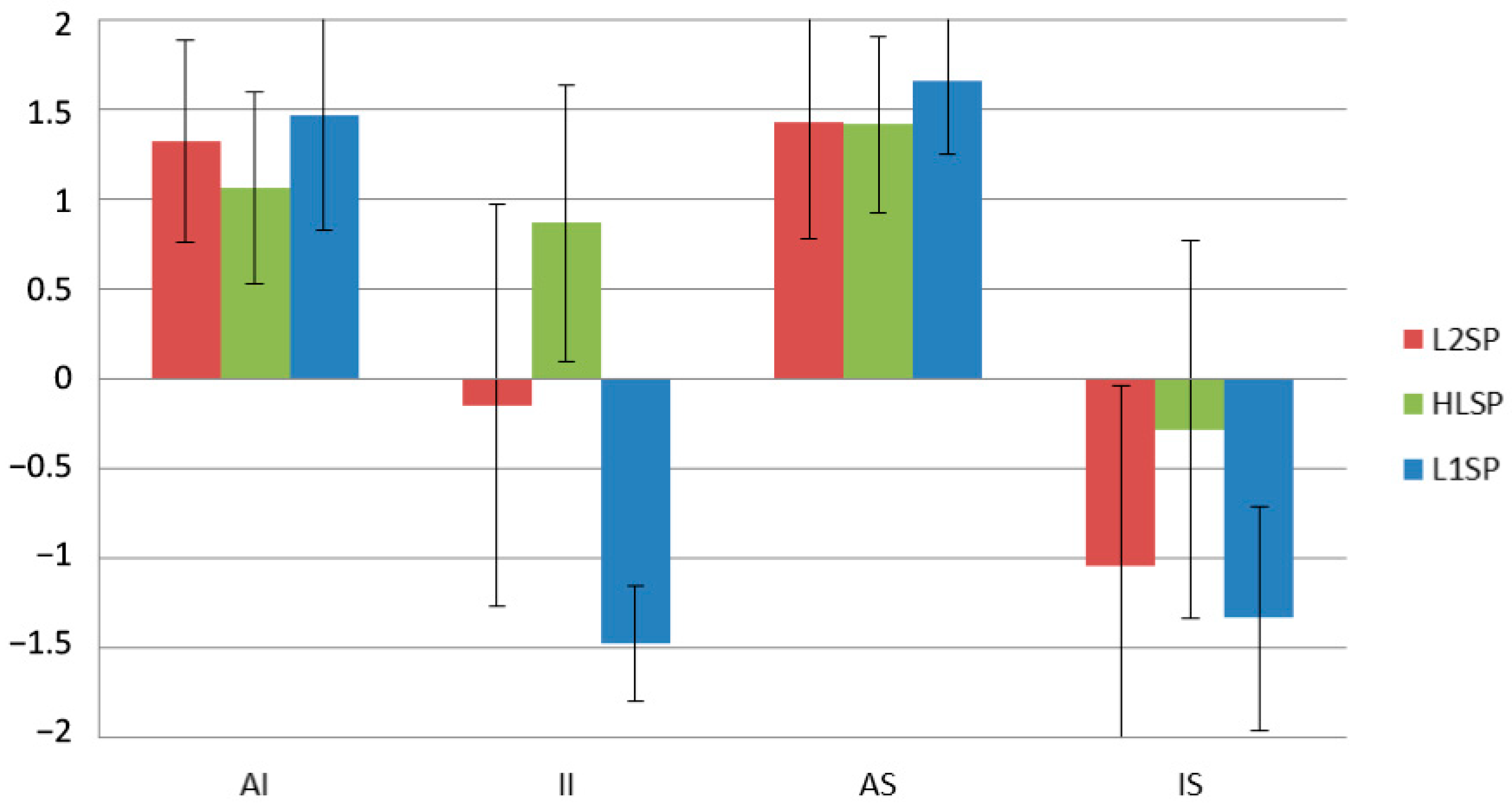
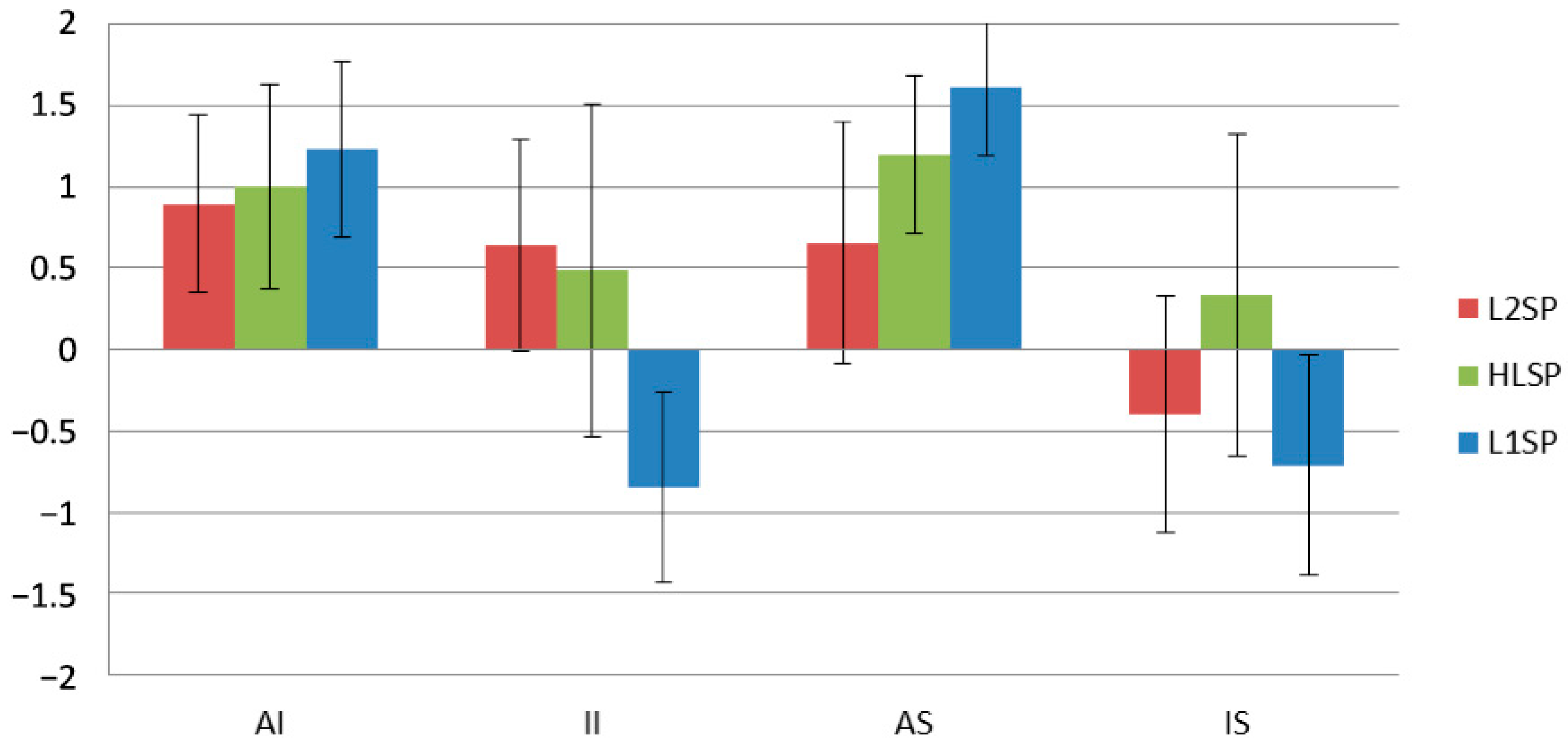
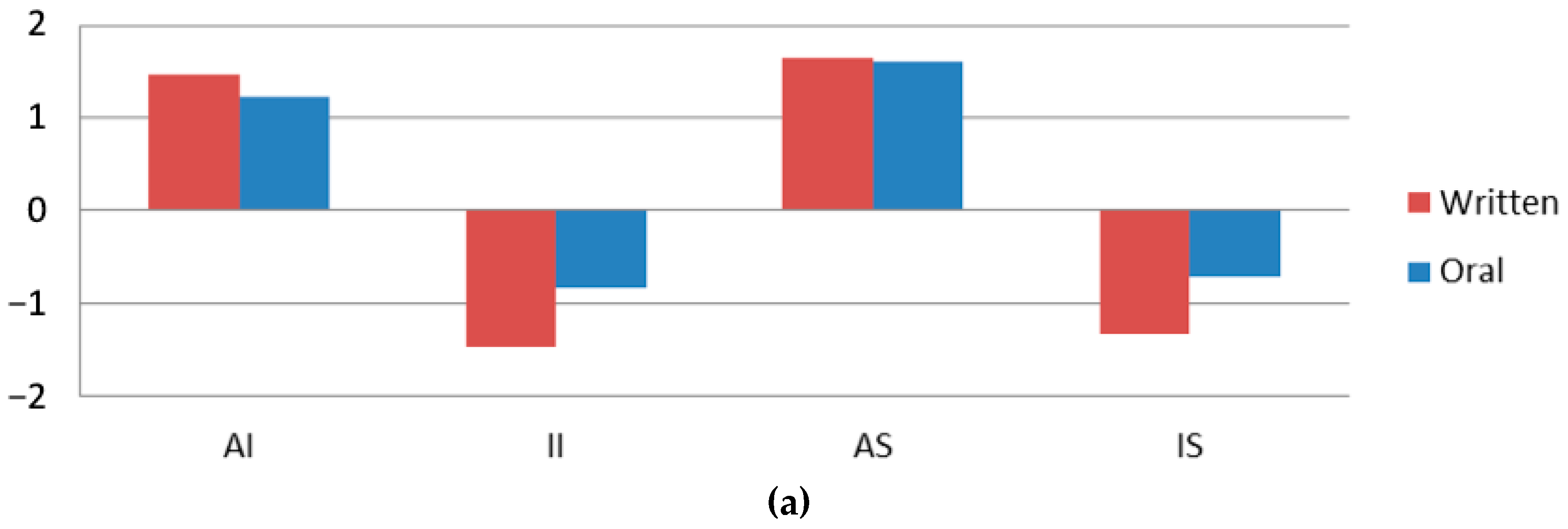
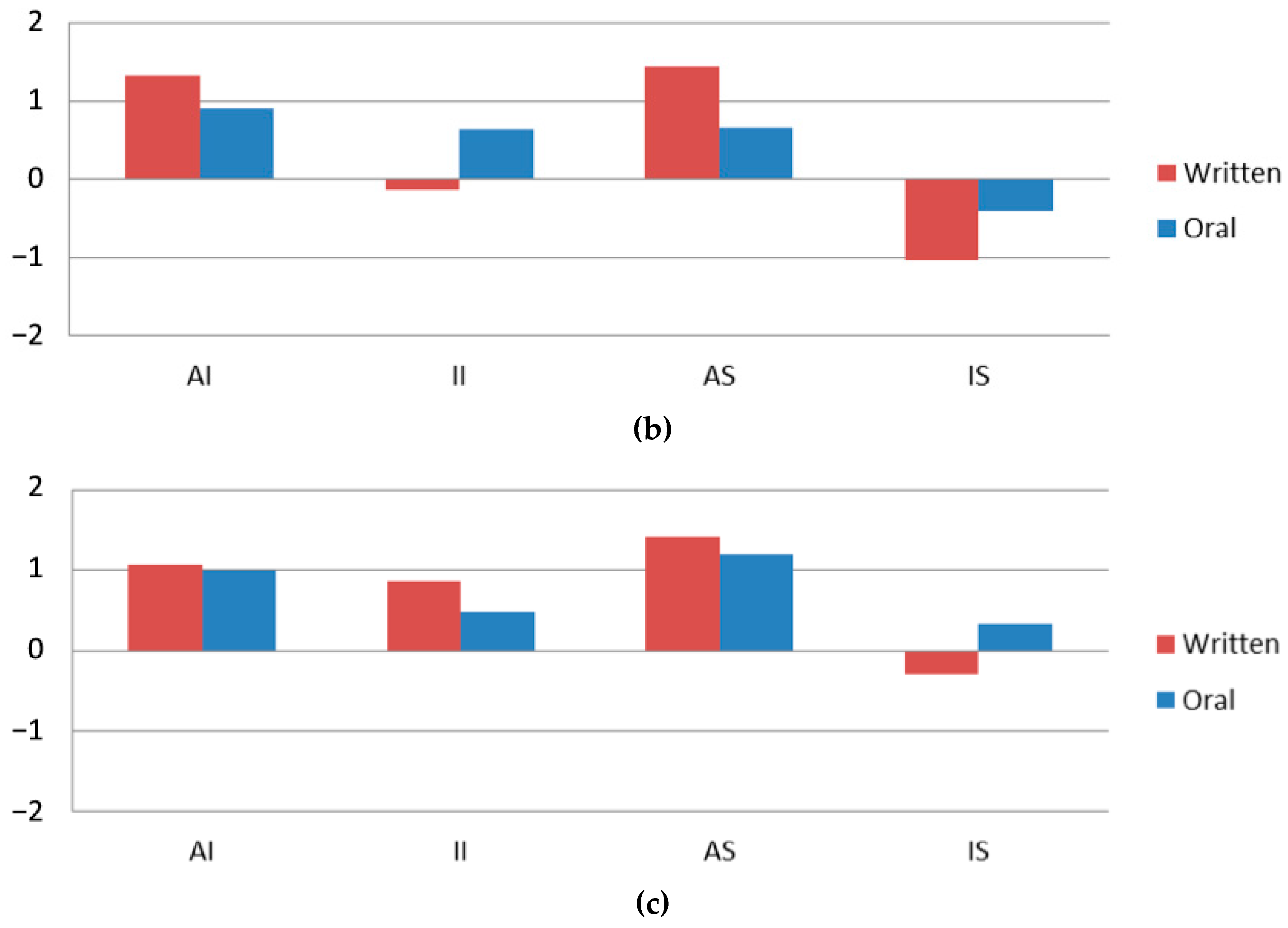
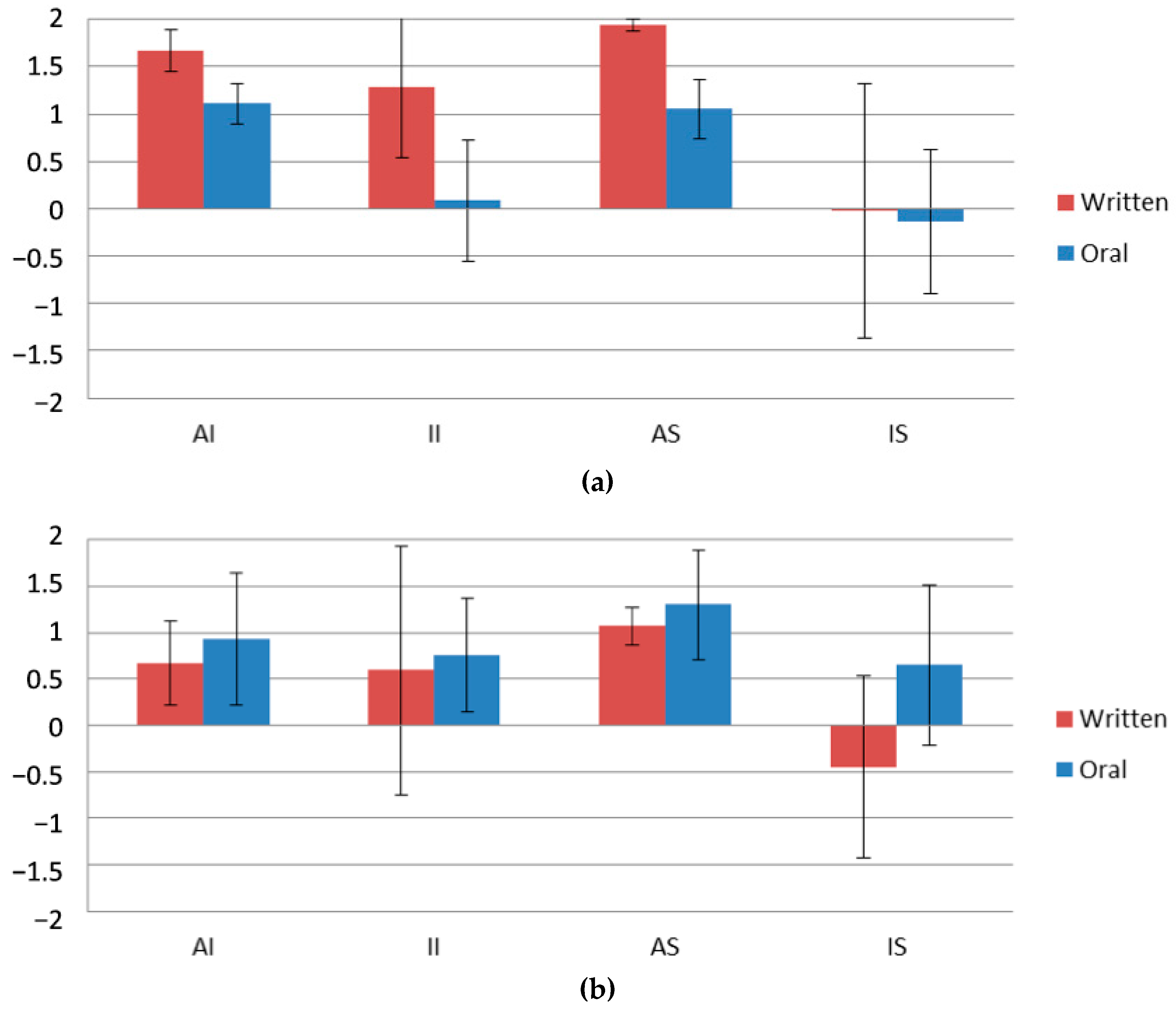
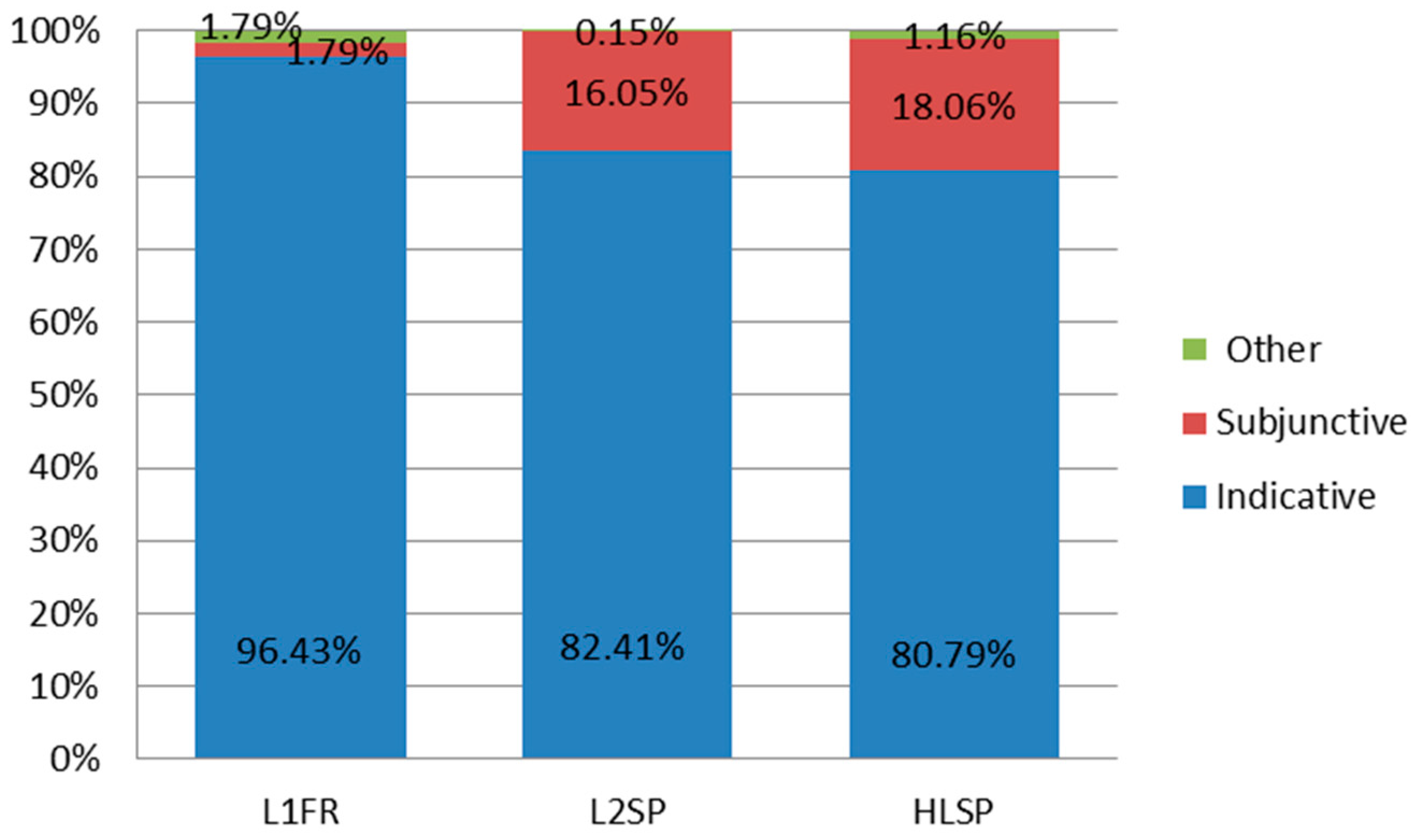
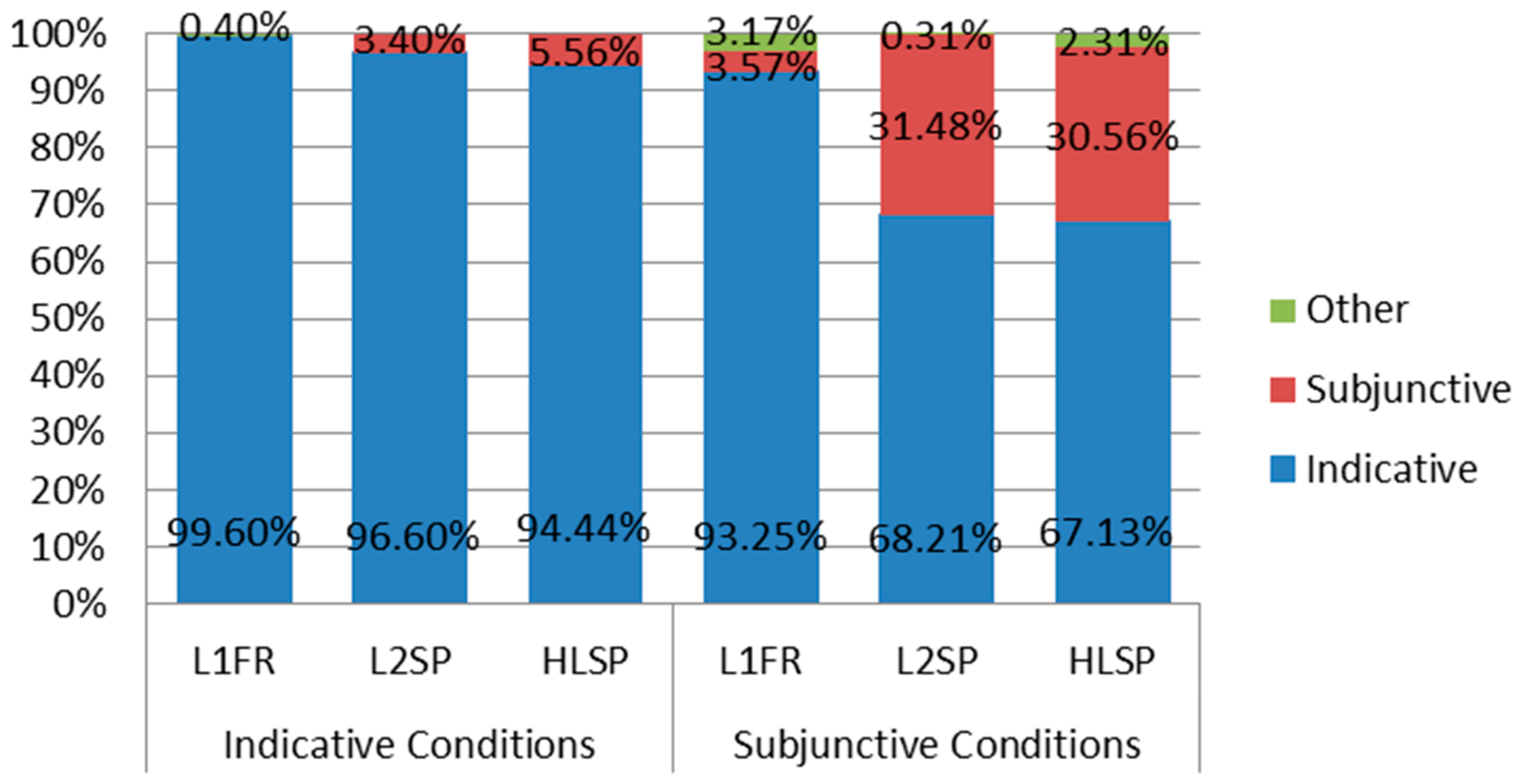
| Group | Task 1 | Task 2 | Task 3 |
|---|---|---|---|
| L2SP | n = 10 [Median age = 27.7] | n = 18 [Median age = 31.5] | n = 12 [Median age = 31.25] |
| HLSP | n = 10 [Median age = 25.9] | n = 13 [Median age = 24.7] | n = 10 [Median age = 21.9] |
| L1FR | n = 14 [Median age = 40.2] | ||
| L1SP | n = 11 [Median age = 41.5] | n = 21 [Median age = 37] |
| Group | AoA of Spanish | AoA of French | Spanish Acquisition Setting | Spanish Input Mode |
|---|---|---|---|---|
| L2SP | >15 years | since birth | instructed (classroom) | written and aural (literacy) |
| HLSP | since birth | since birth (simultaneous)//4–7 years (sequential) | naturalistic (home) | aural |
© 2018 by the authors. Licensee MDPI, Basel, Switzerland. This article is an open access article distributed under the terms and conditions of the Creative Commons Attribution (CC BY) license (http://creativecommons.org/licenses/by/4.0/).
Share and Cite
Alba de la Fuente, A.; Cruz Enríquez, M.; Lacroix, H. Mood Selection in Relative Clauses by French–Spanish Bilinguals: Contrasts and Similarities between L2 and Heritage Speakers. Languages 2018, 3, 31. https://doi.org/10.3390/languages3030031
Alba de la Fuente A, Cruz Enríquez M, Lacroix H. Mood Selection in Relative Clauses by French–Spanish Bilinguals: Contrasts and Similarities between L2 and Heritage Speakers. Languages. 2018; 3(3):31. https://doi.org/10.3390/languages3030031
Chicago/Turabian StyleAlba de la Fuente, Anahí, Maura Cruz Enríquez, and Hugues Lacroix. 2018. "Mood Selection in Relative Clauses by French–Spanish Bilinguals: Contrasts and Similarities between L2 and Heritage Speakers" Languages 3, no. 3: 31. https://doi.org/10.3390/languages3030031
APA StyleAlba de la Fuente, A., Cruz Enríquez, M., & Lacroix, H. (2018). Mood Selection in Relative Clauses by French–Spanish Bilinguals: Contrasts and Similarities between L2 and Heritage Speakers. Languages, 3(3), 31. https://doi.org/10.3390/languages3030031





